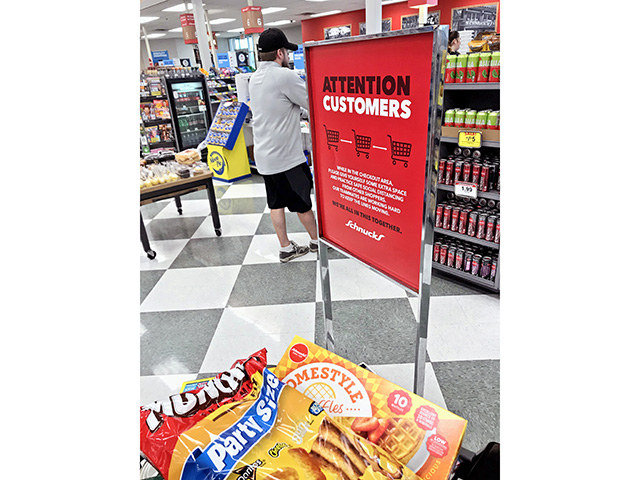We'd Like To Mention
COVID-19 Alters Foodscape
The recent pandemic has not only disrupted our lives but how we live. Everyday tasks we took for granted now require extra preparation and precaution. Trips to my local grocery store, for example, now entail a long list of safeguards that include wearing a mask, a one-way entrance/exit, social distancing while pushing a presanitized cart, directional arrows in the aisles and hand sanitizer stations.
The repercussions of COVID-19 go beyond our daily routines. It has broken down segments of the food industry. As the virus began to grip the country in March, shortages of food staples were common. Sick workers idled meat-processing plants. Closed restaurants, hotels and schools wiped out demand. In the aftermath, producers were forced to dump milk, watch unharvested vegetables rot in fields and euthanize livestock. America's bounty was unable to move through normal distribution channels, causing economic havoc for the country's farmers and ranchers.
As a result, our entire food system -- from field to fork -- is being reevaluated. In a recent survey by the American Farm Bureau Federation, three in five adults (59%) felt the federal government should classify U.S. agriculture as a matter of national security to ensure a stable food supply. More than four in five adults (85%) thought COVID-19 had impacted the food supply chain.
P[L1] D[0x0] M[300x250] OOP[F] ADUNIT[] T[]
"The results of the survey indicate a growing understanding of how important a stable food supply is to the health and well-being of our nation," says the organization's president Zippy Duvall. "Shortages at grocery stores and other food supply chain shockwaves caused by the pandemic gave many people a new understanding of the crucial role of America's farmers and ranchers, and the importance of their survival through the COVID-19 economic storm."
According to a report on the virus's economic impacts on food and ag markets by the Council for Agricultural Science and Technology, "These disruptions have exposed critical gaps in our knowledge of how to make the agrifood sector and supply chain more resilient and adaptable to major crises, such as pandemics."
The report pinpoints areas that need to be addressed to counter future shocks in order to move goods from farm to consumer. Two examples:
> The nation's food supply chain is built to optimize volume and efficiency. Food flows through two channels: food service (institutions) and retail. When the virus shut down demand from institutions, our rigid supply chain prevented goods normally designated for food service to easily switch over to retail to meet surging demand. The report singles out fresh produce and stresses the need to create a more flexible supply chain with fully interoperable packing lines, greater use of technology and fully fungible transportation systems. Other food goods will require similar changes to enhance adaptability.
> The pandemic challenged the meat-processing sector like no other supply chain. Large declines in food service activity gave way to huge swings to grocery stores. Then, COVID-19 infected workers, forcing processing plants to close or reduce capacity. Livestock prices plummeted because producers couldn't get animals to market. Consumers saw shortages and higher prices. Calls for change could include a mix of additional automation within plants to reduce dependence on labor, more cold storage capacity or adjustments in the number, size or design of facilities.
Conversations are just beginning on how to tweak and, in some cases, overhaul the nation's foodscape to make it more resilient regardless of unforeseen circumstances. Solutions will lead to long-term changes in how food is produced, packed and shipped while providing farmers and ranchers a more stable marketplace.
> Write Gregg Hillyer, 2204 Lakeshore Dr., Suite 415, Birmingham, AL 35209, or email gregg.hillyer@dtn.com.
[PF_0820]
(c) Copyright 2020 DTN, LLC. All rights reserved.



